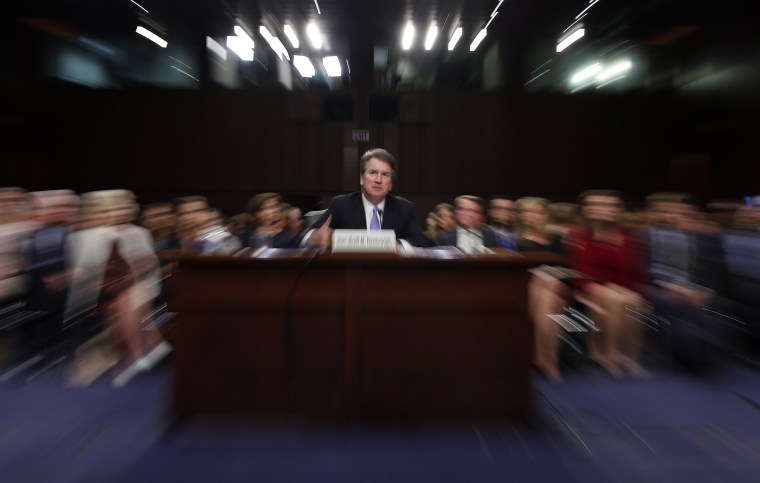Before Christine Blasey Ford identified herself as the woman who accused Supreme Court nominee Brett Kavanaugh of assaulting her during their high school years, I would have told you that I know exactly how this movie ends. We're seen it before: Her retreat into battered silence after three full acts of survivor-blaming, macho back-slapping, statistically false yet anecdotally-bulletproof claims of the prevalence of false accusations of sexual violence, doxxing, bullying and scorn, with a happily-ever-after for one lucky fella.
The formula told us that Ford would come forward, rape apologists and survivor-blamers would pull out their predictable bag of tricks in an attempt to discredit her, liberal lawmakers and feminist activists would rush to Ford’s defense, and when the dust settled, Kavanaugh will be on the court. There would be no third-act twist here.
The process by which the American public evaluates women who levy accusations of sexual violence against men who look like Brett Kavanaugh, after all, is depressingly predictable, as reliable as an expiration date.
It's Senate Judiciary Committee Chairman Chuck Grassley, saying, “We’re talking about, you understand we’re talking about 35 years ago. I’d hate to ask, have somebody ask me what I did 35 years ago”?
It's Megyn Kelly’s suggestion on the TODAY show that “Maybe [Kavanaugh's accuser] had a negative experience with him. Maybe he blew her off!”
And it's 65 women’s names on a solicited letter to the Senate Judiciary committee vouching that he'd never done anything untoward to them — a letter based on the idea that if Brett Kavanaugh has not attacked every woman he’s ever met, surely he has never attacked any woman at all.
But this one feels different.
Perhaps because Sen. Kamala Harris, D-Calif., stood firm on CBS News, saying, “"My concern is, and she knows this, she is putting herself out there, knowing they're going to try to excoriate her and she's doing it because she knows this is an important matter, it's a serious matter who serves on that court and she has the courage to come forward, she has nothing to gain."
Or because Sen. Maizie Hirono, D-Hawaii, said at a press conference, directly into a microphone and in front of a grinning young male aide, “I just want to say to the men of this country, just shut up and step up. Do the right thing for a change.”
Or because, in the private sector, Georgetown Law professor Dr. Heidi Li Feldman started a GoFundMe campaign to help cover the costs of Dr. Blasey Ford’s private security. The campaign stopped accepting funds after 1,708 people raised $53,840 in 13 hours, and then reopened for contributions for one final day and raised over $175,000 in total. Dr. Feldman has never met Dr. Blasey Ford.
Or even because Kellyanne Conway, the head of the 2016 Trump campaign and originator of the phrase "alternative facts," gave a statement to CNN in which she said, “Let me be very clear on behalf of the president with whom I’ve spoken at length about this… she should not be ignored or insulted. She should be heard.”
Why is this one different? Surely #MeToo has played a significant role. The hashtag — initiated by Tarana Burke of Girls for Gender Equity — has decloaked the prevalence of sexual violence on an international scale. And, the accusations against Brett Kavanaugh do reveal how many of our previously unassailable social norms about sexual harassment and assault are well past their expiration date.
Women are past hoping for a tipping point; we are past requesting acknowledgement. We are demanding that everyone step up for victims, for a change, and I believe that the resistance to the character assassination of Christine Blasey Ford is evidence of a seismic social shift, a fatal tremor in the bedrock of the idea that an accusation of sexual violence is far more traumatic than an act of sexual violence.
We are witnessing an extinction-level event.
I believe that “boys will be boys” can begin counting down the days to retirement. I believe that the next time someone's defender rustles up a passel of women to exonerate him of sexual assault because he once spent thousands of consecutive minutes in their presence without attempting a single rape, a thundering chorus of Senators and columnists and humorists and parents will reply, “That’s not how alibis work,” and they will be heard.
I believe we are witnessing an extinction, but , like most extinctions, this has been happening for decades already, and its continued progress relies on our constant skepticism of the traditional narratives. It would be very easy — as we saw in 2016 — for us to take women's progress for granted and then watch, gobsmacked, as “boys will be boys” becomes the 28th amendment.
Until these ideas finally expire, they will continue to haunt us. An extinction-in-progress will cause some to cling even more tightly to the status quo, because until these ideas finally expire, they will remain desperate to survive by any means necessary. Survivor-blaming and other toxic tropes have already survived long past our collective ability to see right through them — not because they are right, but because they have convinced us that we don’t need to examine them closely.
In this time of dramatic social change, it’s more important than ever that we do just that. And when someone questions Christine Blasey Ford in a way that we've all heard before, know that you don't have to listen.





